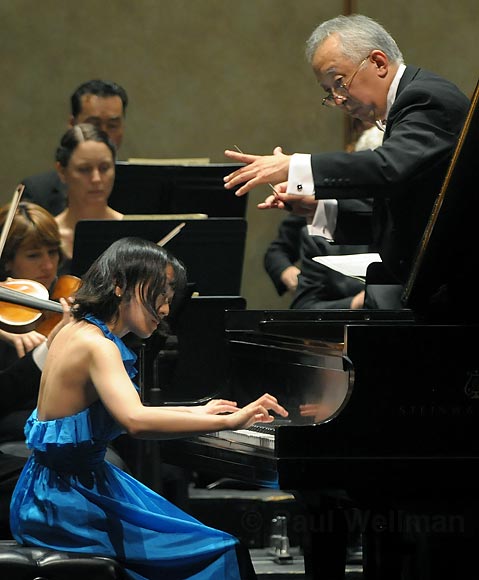Santa Barbara Chamber Orchestra, with Rieko Aizawa
SBCO Begins New Season at the Lobero
The order of the program for this, the opening concert of the season for Maestro Heiichiro Ohyama and the Santa Barbara Chamber Orchestra, got rearranged at the last minute. As a result, the audience was treated to a first-half display of the ensemble’s lean, intelligent, and sensitive approach to the symphonic music of Franz Joseph Haydn.
Haydn’s Symphony No. 101 in D Major comes from the second of his two triumphant late-career stints in London. It gets its nickname, The Clock, from some memorable interplay in the second movement “Andante” between the strings’ pizzicato and the bassoons, here played by Judith Farmer and Andrew Klein. Under Ohyama’s baton, the complex structures of this musically sophisticated symphony were rendered with appropriate clarity and lightness. Haydn’s dreamlike playfulness came to the fore in the second and third movements, and the entire thing came to a very satisfying resolution in the “Finale,” which concludes in a fugue.

For an introduction to the second half of the concert, the orchestra played a very well-known piece by Felix Mendelssohn-the “Fingal’s Cave” portion of The Hebrides Overture, Op. 26. Besides offering another example of a continental response to the British Isles, this hot chestnut gave the winds and, in particular, the clarinets of Larry Hughes and Peter Nevin, a chance to shine.
By the time guest soloist Rieko Aizawa emerged in her royal blue evening gown, the audience had already heard quite a lot of music, but any lingering concerns were wiped away as Aizawa came roaring into the opening movement of Mendelssohn’s Concerto No. 1 in G Minor, Op. 25. It’s one of the more ostentatious entrances in the piano repertoire, but Aizawa negotiated it with the necessary drive and without any unnecessary flash, a balance she succeeded in maintaining throughout the performance. Like the more familiar “Fingal’s Cave,” this concerto demonstrates Mendelssohn’s authority with the development of memorable fragments into the components of recognizable forms. Aizawa’s solo encore was just the lullaby to send the audience off with into a night of sweet dreams.



